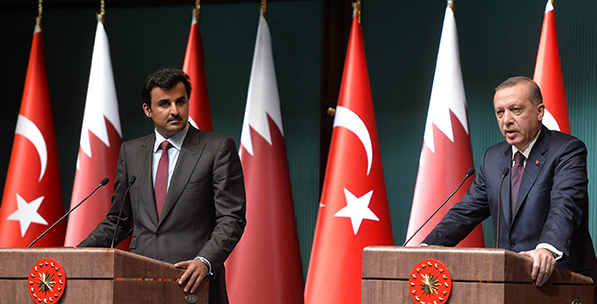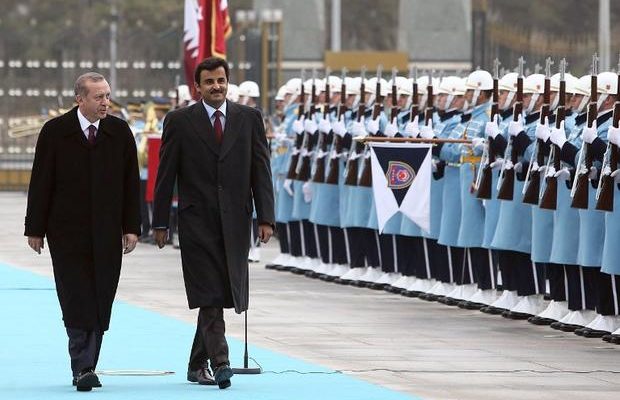
The Syrian civil war presented another political theatre where both Turkey and Qatar advanced the same script and assumed similar character. Both provided strong support to certain groups within the motely of Syrian opposition. When Turkey miffed the Russian bear by downing one of its fighter jets, Qatar offered about $3 billion in financial support to make up for Turkey’s loss of Russian tourism. It also promised gas export guarantees were Moscow decided to withhold natural gas supplies to Ankara. The amiable relationship between the two countries has been helped by personal bonds established between President Recep Tayyip Erdogan and Prince Tamim bin Hamad Al Thani.[1] On top of these, there is a considerable mutual economic benefit as well. Qatar is a major investor in Turkey’s $857 billion economy, with interests in media, financial and defense companies.[2] The emerging Turkish military industry also sees a lucrative market in Qatar. Given its problematic historical relations with Saudi Arabia, which has seen the later breathing down its neck at will, Qatar has been looking for ways to free itself from this lopsided relationship. And courting a major regional ally, apart from Saudi Arabia, was one way of asserting its independence.
The Turkish and Qatari relationship came in handy in 2014 when Gulf states led by Saudi Arabia called back their ambassadors to Qatar in protest of the latter’s continuous support of the Muslim Brotherhood. In December 2014, both countries signed a military agreement that stipulated the deployment of Turkish troops on Qatari soil. This agreement was a concretization of their previous defense agreements reached in 2007 and 2012.[3] Qatar proved to be a friend in need a friend indeed for showing instant support to Erdogan in the wake of the failed July 2016 coup attempt.
The dilemma of Turkish diplomacy in the Gulf region can only be clear if its relationship with Qatar is juxtaposed with its concomitant relations with the major Gulf States. Despite being on different pages on different issues, Turkey and some of the major Gulf States, including Saudi Arabia, United Arab Emirates and Bahrain, have profitable ties. In the context of Saudi and Iran rivalries, Turkey’s natural Sunni impulse has been tilting it towards the former. Plus, there has been considerable economic and financial advantages that accrue for Turkey from Saudi and Emirati investments. So, Turkey has presumably a lot to lose from siding with one party in the current Gulf conflict. True to character, however, Erdogan was quick to make an opinionated position when the crisis broke. He condemned the blockade on Qatar by Saudi Arabia, UAE, and Egypt as “inhumane” and “un-Islamic.”[4] Immediately after the announcement of the blockade, Turkey’s parliament authorized a phased deployment of around 3000 Turkish troops in Qatar. The deployment of troops was part of the 2014 agreement the two countries signed. But the current Gulf crisis presented the occasion to expedite the process. Ankara also offered food supplies to Doha and government owned and affiliated media outlets were instructed to make a massive pro-Qatar media campaigns.
Pundits have tried to explain the Turkish move to support Qatar in economic and political terms. It is said that Turkey’s move is informed by its apprehension that the allegation against Qatar of supporting Muslim Brotherhood and Hamas can be extended to it; financial and economic concerns; and a potential backlash respecting Turkish policies in Iraq and Syria.[5] This explanation does not make sense on two accounts. First, the volume of trade between Turkey and the Saudi Arabia and Emirates is bigger than the financial and economic benefits Turkey gains from its relationship with Qatar. Second, respecting Syria and Iraq, there is no substantial difference between Turkey and Saudi Arabia and Emirates. Considering these facts, Turkish move can be more plausibly explained by the AKP’s and its head’s ideological predisposition and post-coup political climate that make for knee-jerk reactions. Erdogan is churning a narrative that paints the Gulf crisis as part of the grand conspiracy that has undoing Turkey as its aim. Therefore, the hasty move made by Turkey should be seen as part of the drive that has been informing its stormy relations with its Western allies and regional rivals.
Recent Turkish diplomatic moves, which has led the country to hot political waters, is structured around a certain pattern. An impulsive decision is made to be followed by a sudden U-turn. This is witnessed in the Russian fighter jet debacle; negotiations with the EU and relations with the US. There are signs that this pattern will be repeated in the current Gulf crisis. Turkish officials have already tried to sanitize the image of their decision to deploy military forces to Qatar as innocuous gesture to train Qatari’s forces for internal security. It is also reported that Turkey has offered the same thing to Saudi Arabia. Turkey has also offered to broker peace between the two parties. But, nobody is impressed. In fact, one of the demands that the Saudi camp has made to Qatar is the complete withdrawal of Turkish troops from Qatar. Saudi Arabia has also shown its displeasure against Turkey by detaining two Turkish journalists who accompanied Turkey’s foreign minister to Saudi Arabia.[6]
Erdogan has been on the wrong side of the equation many times. His failed Syrian policy is a good case in point. Therefore, is the current Gulf crisis an opportunity for Turkey to assert its power or is it another mindless entanglement that the country has been indulging in for the last few years? Should not the bruises that the country has borne in its relations with the European Union and the United states be a reminder for the country to sail cautiously in dangerous waters? It is hard to predict the future, but the most likely outcome for Turkey from this crisis will be not optimistic.
Joe Hammoura is a specialist in Middle Eastern and Turkish affairs and the co-founder of Leadership for Sustainable Development NGO. He is currently pursuing his Ph.D. in International Relations at Kocaeli University in Turkey. He holds a Masters degree in International Relations with Honors from the Holy Spirit University of Kaslik – Lebanon (2015). His work focuses on the internal Turkish policies, foreign affairs and its direct and indirect implications on the Middle East. Additionally, he writes for the Legal Agenda Magazine, and is a fellow researcher in Turkish Affairs in the Middle East Institute for Research and Strategic Studies (MEIRSS).
[1] Gurbuz, Mustafa (2017), Turkey and the Gulf Crisis: Erdogan’s Most Difficult Game, Arab Center Washington Dc, Retrieved from: http://arabcenterdc.org/policy_analyses/turkey-gulf-crisis/
[2] Ant, Onur (2017), Turkey Lines Up Behind Qatar as Gulf Crisis Fault Lines Deepen, Bloomberg, Retrieved from: https://www.bloomberg.com/news/articles/2017-06-07/turkey-lines-up-behind-qatar-as-gulf-crisis-fault-lines-deepen
[3] Gurbuz, Mustafa (2017), op. cit.
[4] Al-Haj, Saeed (2017), Analysis: The Implication of the Qatar-Turkey Alliance, Aljazeera, Retrieved from: http://www.aljazeera.com/indepth/features/2017/06/implications-qatar-turkey-alliance-170618110726262.html
[5] Gurbuz, Mustafa (2017), op. cit.
[6] Ergan, Uğur (2017), Two TRT World reporters briefly detained during Turkish FM’s visit to Saudi Arabia, Hurriyet Daily News. Retrieved from: http://www.hurriyetdailynews.com/two-trt-world-reporters-briefly-detained-during-turkish-fms-visit-to-saudi-arabia.aspx?pageID=238&nID=114434&NewsCatID=352







